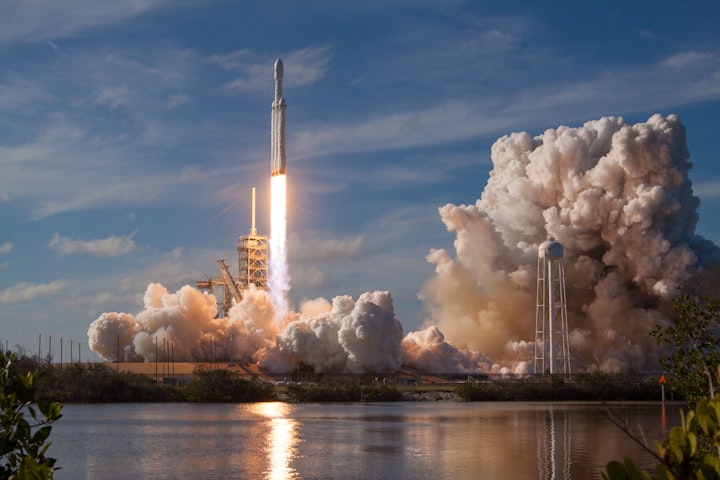Title: NASA: Pioneering Exploration and Scientific Discoveries
- Introduction :
The National Aeronautics and Space Administration (NASA) stands as a symbol of human ingenuity and exploration. Established in 1958, NASA is an independent agency of the United States federal government responsible for the nation's civilian space program. It has played a pivotal role in advancing our understanding of the universe, pushing the boundaries of human knowledge, and inspiring generations with its remarkable achievements. This essay delves into the multifaceted nature of NASA, highlighting its missions, scientific discoveries, technological advancements, and its contributions to humanity.
- NASA's Missions :
NASA's primary mission revolves around space exploration, scientific research, and aeronautics. Over the years, NASA has undertaken numerous groundbreaking missions that have expanded our knowledge of the cosmos. One of its most significant accomplishments was the Apollo program, which culminated in the historic landing of humans on the Moon in 1969. This achievement marked a turning point in human history and showcased NASA's determination and technological prowess.
Furthermore, NASA has successfully launched robotic missions to various celestial bodies in our solar system, including Mars, Venus, Jupiter, and Saturn. The Mars rovers, such as Spirit, Opportunity, and Curiosity, have revolutionized our understanding of the Red Planet, providing valuable insights into its geology, climate, and potential for habitability. Additionally, the Voyager spacecraft, which are currently exploring interstellar space, have transmitted invaluable data about our outer planets and continue to inspire awe and wonder.
- Scientific Discoveries :
NASA's pursuit of scientific knowledge has resulted in groundbreaking discoveries that have reshaped our understanding of the universe. One of the most significant contributions has been the discovery of exoplanets—planets orbiting stars outside our solar system. The Kepler space telescope, launched by NASA in 2009, revolutionized exoplanet research by identifying thousands of potential exoplanets, unveiling the vastness of our galaxy and raising intriguing questions about the existence of life beyond Earth.
NASA's exploration of Mars has also yielded significant scientific findings. The Mars Science Laboratory (MSL) mission, featuring the Curiosity rover, discovered evidence of ancient water on the Martian surface, indicating that Mars was once a habitable environment for microbial life. Furthermore, NASA's InSight mission, focused on studying the planet's interior, provided valuable insights into Mars' seismic activity, shedding light on its geological evolution.
- Technological Advancements :
NASA's pursuit of space exploration has fostered the development of cutting-edge technologies that have applications beyond space missions. The quest to reach the Moon led to the invention of numerous innovations, including miniaturized electronics, lightweight materials, and advanced navigation systems. These technological advancements have found their way into various industries, such as telecommunications, medicine, and transportation, improving the lives of people worldwide.
NASA's efforts have also pushed the boundaries of human spaceflight. The development of the Space Shuttle program, which operated from 1981 to 2011, revolutionized space transportation, allowing for the deployment of satellites, the construction of the International Space Station (ISS), and the repair and servicing of spacecraft in orbit. The ISS itself stands as a remarkable example of international cooperation and serves as a platform for scientific research, technological development, and fostering global partnerships.
- Contributions to Humanity :
Beyond scientific discoveries and technological advancements, NASA's impact on humanity extends to various areas. The agency's Earth observation satellites provide crucial data about our planet's climate, weather patterns, and natural disasters, helping governments and organizations make informed decisions to mitigate the impacts of climate change and protect human lives.
Furthermore, NASA's educational initiatives and outreach programs inspire and engage young minds, nurturing the next generation of scientists, engineers, and
explorers. Through initiatives like the "NASA at Home" program and collaborations with schools, NASA sparks curiosity and fosters scientific literacy, igniting a passion for space exploration among the youth.
- Conclusion :
NASA's unparalleled achievements and unwavering commitment to the pursuit of knowledge have solidified its status as a global leader in space exploration and scientific research. From the Moon landings to the discovery of exoplanets and the development of groundbreaking technologies, NASA's contributions have touched countless lives and transformed our understanding of the universe. As we look towards the future, NASA continues to inspire us to reach for the stars, broadening our horizons and unlocking the mysteries of the cosmos for the betterment of humanity.
About the Creator
Malik Hady
Hey there
Im a professional writer based in Pakistan.I love to write about the beauty of the countries and about their tourism.






Comments
There are no comments for this story
Be the first to respond and start the conversation.